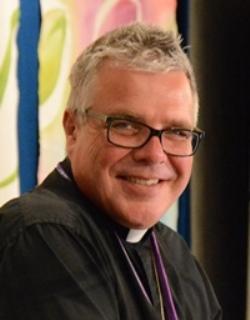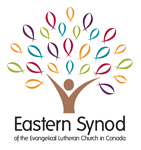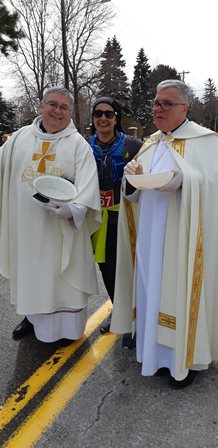
It’s a phrase we hear, read and perhaps say quite often. In moments of catastrophe and loss; in times of crisis or disaster, the flow of “thoughts and prayers” through my twitter feed can become a torrent.
And in its wake there is often a subsequent torrent telling us in no uncertain terms what we can do with our “thoughts and prayers!” Some are downright nasty. Some would require impossible acts of physical dexterity! Others offer the necessary reminder that “thoughts and prayers” without further action can often ring hollow and risk becoming empty and meaningless platitudes.
Earlier today I received a voicemail message from one of our retired pastors, reminding me that today – as everyday – she had prayed for me, my family and for our church. She has faithfully engaged in this holy and generous practice for as long as I have served in this capacity.
Her thoughts and prayers have not been empty or meaningless. Indeed, they have been a constant and refreshing wellspring of encouragement and blessing to me and to the many others who are privileged to be included in her daily prayer list.
I suspect that a lot of the “thoughts and prayers” backlash has come as a result of the propagation of simplistic or just plain wrong understandings or what prayer is and how it functions.
In a piece I coincidently viewed this morning,Nadia Boltz-Weber reflects that ”I used to think that prayer was like the quarter that you put into God’s vending machine so he would release the gumball you wanted. Like prayer is like handing God some kind of wish list of everything you want and if you are a good little boy or girl, then Santa – I mean God- will make sure you get presents!”
Now she has come to understand that “when we pray we hold ourselves and our loved ones and the world up to God and then we pass it off for the next person to do the same. And these prayers, those times when we mindfully hold others in the presence of God, are like gossamer threads connecting us to God and God’s children.”
Prayer is not about getting; it’s about connecting. When I pray, I am connected both to God and to the one for whom I pray. I am seeking to enter into the love that is the heart God’s being and to bring another person, community or set of circumstances into that place with me.
It is not a matter of popping quarter into a slot in an attempt to convince God to do something he wouldn’t otherwise be inclined to do. Rather it is a conscious act of but entering into the loving heart of a God whose total essence is blessing. And in that encounter we, and the world, are changed; for God’s grace cannot and will not leave us as it found us.
When I pray aright, God inspires and emboldens me to express that same divine and loving essence in my words and actions; to become, in effect, an answer to another’s prayer. When offered aright, our thoughts and prayers can’t help but be further expressed in flesh and blood acts of faithful solidarity and generous companionship.
So don’t let the trolls scare you off. Your thoughts and prayers are needed and are more effective than you may ever have imagined!

